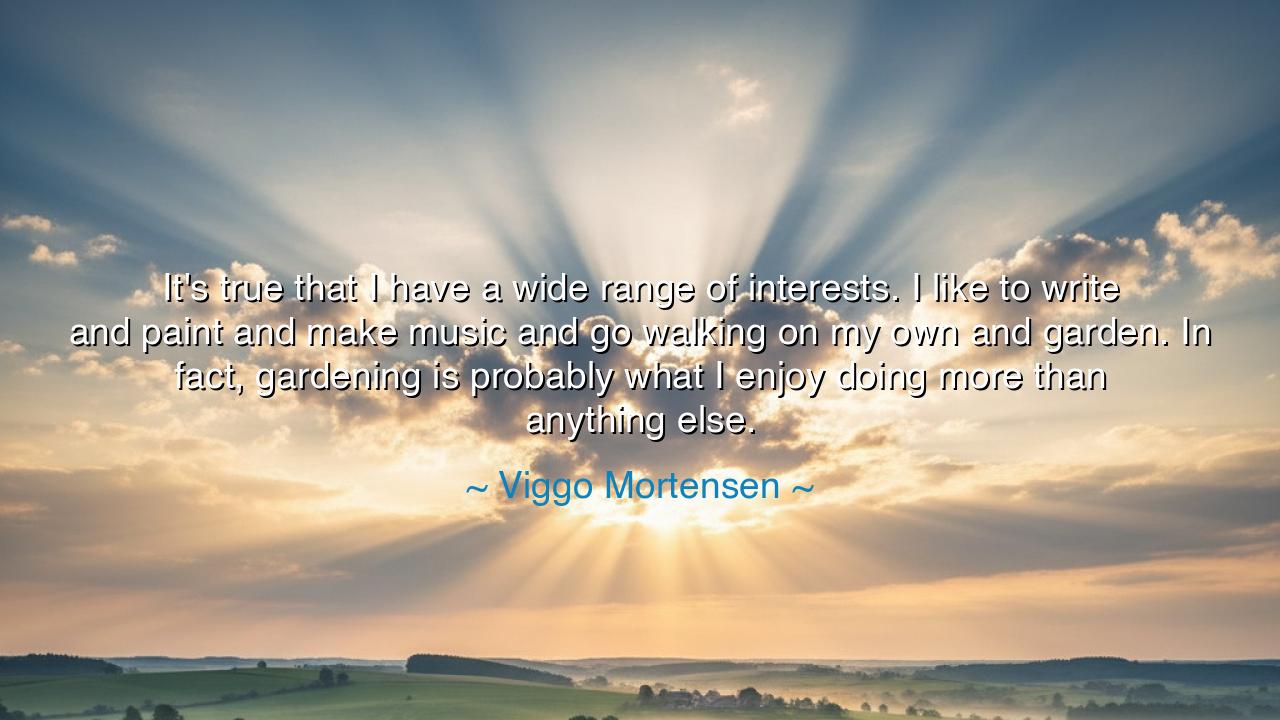
It's true that I have a wide range of interests. I like to write
It's true that I have a wide range of interests. I like to write and paint and make music and go walking on my own and garden. In fact, gardening is probably what I enjoy doing more than anything else.






The words “It’s true that I have a wide range of interests. I like to write and paint and make music and go walking on my own and garden. In fact, gardening is probably what I enjoy doing more than anything else” were spoken by Viggo Mortensen, the actor, poet, painter, and musician whose soul seems to belong more to the timeless world of nature and art than to the fleeting glamour of fame. In this quiet confession lies the wisdom of a man who has sought peace not in applause, but in creation — in the slow, deliberate acts that unite mind, body, and spirit. Mortensen reminds us that the richest life is not lived in pursuit of a single calling, but in the harmonious cultivation of many forms of beauty, and that among all these pursuits, the act of gardening stands nearest to the sacred.
When Mortensen lists his passions — writing, painting, music, solitude, and gardening — he reveals a soul drawn to reflection and craftsmanship, not noise and spectacle. Each of these arts demands patience and sincerity; none can be rushed. To write is to wrestle with truth, to paint is to converse with light, to make music is to breathe in rhythm with the unseen, and to walk alone is to listen to the silence of one’s own heart. Yet among them, gardening holds a special power. For in gardening, art and life become one. The gardener does not merely imagine beauty — he co-creates it with nature, giving form to the eternal. Mortensen’s love for the soil is not accidental; it is the final harmony of all his arts — the living canvas, the breathing poem, the symphony of seasons.
To garden is to practice the art of patience in an age of haste. The garden teaches lessons that no school can impart: the virtue of waiting, the humility of tending, the joy of witnessing slow transformation. Mortensen, whose work spans disciplines, finds in gardening a sacred simplicity — an act stripped of ego. The seed does not bloom for the gardener’s fame; it blooms because it must. In that quiet truth lies the essence of wisdom: that meaning comes not from conquest or recognition, but from care. The garden rewards those who attend to it with love, not those who command it with ambition. Through his words, Mortensen reveals himself not only as an artist but as a philosopher of patience, a man who understands that the truest creation is that which grows naturally, in its own time.
Throughout history, the greatest minds have turned to the soil for solace and insight. Leo Tolstoy, after writing the grandest novels of human struggle, spent his later years farming his land by hand, seeking redemption through honest labor. Voltaire, disillusioned by the chaos of politics and philosophy, ended his tale Candide with the immortal counsel, “We must cultivate our garden.” Both men, like Mortensen, understood that gardening is not merely the act of growing plants — it is the practice of growing oneself. In caring for the earth, we are reminded of our own place within it — not as masters, but as stewards, partners in the eternal cycle of life and decay. The garden humbles the proud, heals the weary, and teaches the restless the rhythm of eternity.
There is also something deeply symbolic in Mortensen’s solitude. “I go walking on my own,” he says — not in loneliness, but in communion with thought and nature. In solitude, he listens to the whisper of creation; in gardening, he answers it. The modern world often fears silence, mistaking it for emptiness, but Mortensen embraces it as the wellspring of creativity. His walks, his art, and his garden are all parts of one continuous act — the act of listening deeply to life. In that listening, he finds renewal. Like a monk in a quiet monastery, he discovers the divine in the small and the ordinary: a leaf, a word, a melody, a patch of earth.
The garden, in Mortensen’s reflection, becomes a metaphor for the inner life. Every person carries within them a soil of the soul — fertile but neglected, waiting to be tended. The weeds of distraction, pride, and haste choke our better nature; the flowers of peace, love, and wisdom wither without attention. To garden outwardly is to remember how to garden inwardly. Mortensen’s enjoyment of this humble task is not escapism, but enlightenment. It is a return to the eternal truth that fulfillment comes not from accumulation, but from cultivation — from the nurturing of what is real, simple, and enduring.
The lesson, then, is luminous: To live well is to create with patience, to love with attention, and to grow in harmony with the quiet rhythm of life. Do not rush your art, your dreams, or your soul — tend them. Plant your passions like seeds in the earth, water them daily with care, and let time and grace bring them to fruition.
Practical actions: Find something each day to nurture — a garden, a craft, a friendship, or your own peace of mind. Seek solitude not as escape, but as renewal. And when the world demands speed, remember Mortensen’s wisdom: that life, like a garden, must be lived at the pace of growth. For in the still, patient tending of what we love, we discover what it means to be fully, quietly, magnificently alive.






AAdministratorAdministrator
Welcome, honored guests. Please leave a comment, we will respond soon